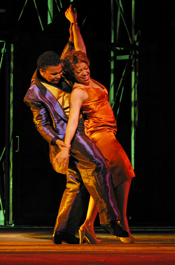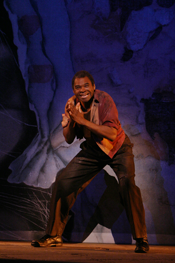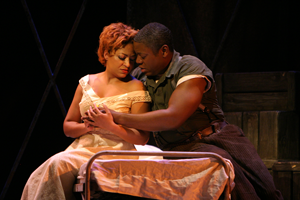
09 May 2007
Porgy and Bess at Los Angeles Opera
Premiered at Washington National Opera, director Francesca Zambello’s Porgy and Bess arrived in Los Angeles May 4th, for a run of 12 performances in just 17 days.
English Touring Opera are delighted to announce a season of lyric monodramas to tour nationally from October to December. The season features music for solo singer and piano by Argento, Britten, Tippett and Shostakovich with a bold and inventive approach to making opera during social distancing.
This tenth of ten Live from London concerts was in fact a recorded live performance from California. It was no less enjoyable for that, and it was also uplifting to learn that this wasn’t in fact the ‘last’ LfL event that we will be able to enjoy, courtesy of VOCES8 and their fellow vocal ensembles (more below …).
Ever since Wigmore Hall announced their superb series of autumn concerts, all streamed live and available free of charge, I’d been looking forward to this song recital by Ian Bostridge and Imogen Cooper.
Although Stile Antico’s programme article for their Live from London recital introduced their selection from the many treasures of the English Renaissance in the context of the theological debates and upheavals of the Tudor and Elizabethan years, their performance was more evocative of private chamber music than of public liturgy.
Evidently, face masks don’t stifle appreciative “Bravo!”s. And, reducing audience numbers doesn’t lower the volume of such acclamations. For, the audience at Wigmore Hall gave soprano Elizabeth Llewellyn and pianist Simon Lepper a greatly deserved warm reception and hearty response following this lunchtime recital of late-Romantic song.
For this week’s Live from London vocal recital we moved from the home of VOCES8, St Anne and St Agnes in the City of London, to Kings Place, where The Sixteen - who have been associate artists at the venue for some time - presented a programme of music and words bound together by the theme of ‘reflection’.
'Such is your divine Disposation that both you excellently understand, and royally entertaine the Exercise of Musicke.’
‘And there was war in heaven: Michael and his angels fought against the dragon; and the dragon fought and his angels, And prevailed not; neither was their place found any more in heaven … that old serpent … Satan, which deceiveth the whole world: he was cast out into the earth, and his angels were cast out with him.’
There was never any doubt that the fifth of the twelve Met Stars Live in Concert broadcasts was going to be a palpably intense and vivid event, as well as a musically stunning and theatrically enervating experience.
‘Love’ was the theme for this Live from London performance by Apollo5. Given the complexity and diversity of that human emotion, and Apollo5’s reputation for versatility and diverse repertoire, ranging from Renaissance choral music to jazz, from contemporary classical works to popular song, it was no surprise that their programme spanned 500 years and several musical styles.
The Academy of St Martin in the Fields have titled their autumn series of eight concerts - which are taking place at 5pm and 7.30pm on two Saturdays each month at their home venue in Trafalgar Square, and being filmed for streaming the following Thursday - ‘re:connect’.
The London Symphony Orchestra opened their Autumn 2020 season with a homage to Oliver Knussen, who died at the age of 66 in July 2018. The programme traced a national musical lineage through the twentieth century, from Britten to Knussen, on to Mark-Anthony Turnage, and entwining the LSO and Rattle too.
With the Live from London digital vocal festival entering the second half of the series, the festival’s host, VOCES8, returned to their home at St Annes and St Agnes in the City of London to present a sequence of ‘Choral Dances’ - vocal music inspired by dance, embracing diverse genres from the Renaissance madrigal to swing jazz.
Just a few unison string wriggles from the opening of Mozart’s overture to Le nozze di Figaro are enough to make any opera-lover perch on the edge of their seat, in excited anticipation of the drama in music to come, so there could be no other curtain-raiser for this Gala Concert at the Royal Opera House, the latest instalment from ‘their House’ to ‘our houses’.
"Before the ending of the day, creator of all things, we pray that, with your accustomed mercy, you may watch over us."
The doors at The Metropolitan Opera will not open to live audiences until 2021 at the earliest, and the likelihood of normal operatic life resuming in cities around the world looks but a distant dream at present. But, while we may not be invited from our homes into the opera house for some time yet, with its free daily screenings of past productions and its pay-per-view Met Stars Live in Concert series, the Met continues to bring opera into our homes.
Music-making at this year’s Grange Festival Opera may have fallen silent in June and July, but the country house and extensive grounds of The Grange provided an ideal setting for a weekend of twelve specially conceived ‘promenade’ performances encompassing music and dance.
There’s a “slide of harmony” and “all the bones leave your body at that moment and you collapse to the floor, it’s so extraordinary.”
“Music for a while, shall all your cares beguile.”
The hum of bees rising from myriad scented blooms; gentle strains of birdsong; the cheerful chatter of picnickers beside a still lake; decorous thwacks of leather on willow; song and music floating through the warm evening air.

Premiered at Washington National Opera, director Francesca Zambello’s Porgy and Bess arrived in Los Angeles May 4th, for a run of 12 performances in just 17 days.
That schedule requires two casts for the main roles, and the second cast performed on May 5th, with your reviewer in attendance.
Peter Davison’s set of a two-story metal framework around a courtyard bears some resemblance to a penitentiary, with sliding doors for the narrow homes of the Catfish Row residences. A smaller frame for Porgy’s room rolls on at crucial points, and the Kittiwah island scene change passes quickly, with the main set pushed to one side and a blue background dropped in. Zambello expertly maneuvers her cast around this set, establishing the tightness of the community and yet also the sense of oppression enforced by its poverty.
 Dave Kopplin’s forthright program essay covers both the history of the opera’s creation and the
issues — controversy, if one must — about the nature of an opera about African-Americans
entirely created by whites. Likewise, it is somewhat unfortunate that here in 2007, one’s best
chance to encounter the talents of African-American performers on an opera stage remains in a
revival of the opera, but at least at this stage of our history, any controversy seems less pertinent
than an appreciation for the opportunity to enjoy the greatness of Gershwin’s score.
Dave Kopplin’s forthright program essay covers both the history of the opera’s creation and the
issues — controversy, if one must — about the nature of an opera about African-Americans
entirely created by whites. Likewise, it is somewhat unfortunate that here in 2007, one’s best
chance to encounter the talents of African-American performers on an opera stage remains in a
revival of the opera, but at least at this stage of our history, any controversy seems less pertinent
than an appreciation for the opportunity to enjoy the greatness of Gershwin’s score.
Zambello can’t do much about the libretto’s monochrome characterization, with the noble residents of Catfish Row beset by trouble created by their much-less than-noble denizens (Crown and Sportin’ Life). The whites are even more crude caricatures, cruelly and capriciously exercising their power, here with unsubtle glee.
 On Saturday night, Alfred Walker’s Porgy brought a deeper scale to the drama, fully inhabiting a
figure of quiet dignity, not merely self-pitying or helpless. Some may regret how the character’s
deformity was muted, with Porgy only reliant on crutches to move his weak legs around. In
Zambello’s depiction, Porgy is a man who has let his innate strength go unused, and it makes
sense to see him as less crippled physically than emotionally stunted, at least until his desperate
love for Bess makes him find that inner core of determination. Walker brought all this out
beautifully, and his firm bass-baritone voice rang out handsomely.
On Saturday night, Alfred Walker’s Porgy brought a deeper scale to the drama, fully inhabiting a
figure of quiet dignity, not merely self-pitying or helpless. Some may regret how the character’s
deformity was muted, with Porgy only reliant on crutches to move his weak legs around. In
Zambello’s depiction, Porgy is a man who has let his innate strength go unused, and it makes
sense to see him as less crippled physically than emotionally stunted, at least until his desperate
love for Bess makes him find that inner core of determination. Walker brought all this out
beautifully, and his firm bass-baritone voice rang out handsomely.
As Bess, Indira Mahajan sounded best in her ample middle voice, with the top a bit unsteady and tending to spread. She made for a suitably seductive figure, although Zambello couldn’t find a way to believably dramatize her change of mind when she decides to flee with Sportin’ Life to New York City. Her frantic dashing around here made Bess look possessed. Victor Ryan Robertson acted a wonderfully sleazy Sportin’ Life, but his light tenor needed more projection to really bring home his big solos, especially “It Ain’t Necessarily So.” Terry Cook’s Crown veered dangerously close to cartoon villain, making Bess’s attraction to him border on the incredible. Thankfully Cook sang attractively enough to outweigh any quibbles.
Clara’s opening “Summertime” could have used a touch more sweetness from Alyson Cambridge; after that, she sang well and her touching Clara made an appropriate contrast to Bess. Eric Greene partnered her well as her husband Jake. Monique McDonald had the other big female solo, with the most aria-like of the score’s numbers, “My man’s gone now.” McDonald has a big, rich soprano and put this music across with operatic fervor. For your reviewer, the preferred version will always be Sarah Vaughan’s.
Porgy and Bess has a large cast, and they all performed with enthusiasm, although Jennie Ford, choreographer, may have wished for more time in rehearsal (Denni Sayers is credited with the original choreography). John DeMain, long an exponent of the score, conducted the LAO orchestra with professional precision.
The Gershwins’ and Heyward’s opera seemed at home on the Dorothy Chandler stage. Whether one calls it a true opera or not, in a production such as Zambello’s, Porgy and Bess makes for a memorable evening at the opera house.
Chris Mullins